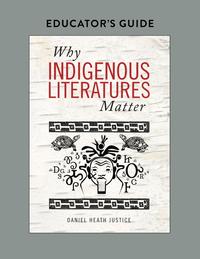“It’s simple: no truth, no reconciliation.” —Justice (p. 159)
Download the Educator Guide PDF here
This curriculum document was created to supplement the text Why Indigenous Literatures Matter, by Daniel Heath Justice (Wilfrid Laurier University Press, 2018). The message throughout the text is summed up with the quote above; without truth and story there can be neither love nor reconciliation. For generations, settler societies have ignored and buried the stories of marginalized people across North America in order to serve the wants of colonization. In particular, the original keepers of this land have not been listened to, thus hindering our ability as human beings to really connect, love, and build kinship. As Daniel Heath Justice states in his book, “the problem has never been a lack of available options, alternatives for finding meaning and purpose in relationship with one another. What’s too often missing is love in all its forms. Finding common ground that honours justice, embraces the truths of our shared history, and works for better futures takes courage and imagination—but most of all, it takes love” (179). This curriculum guide is intended for those educators who work from the starting point of love and justice. It is intended for those who are willing to be uncomfortable in order to do what is in the best interests of their students. It is for those educators who recognize their power, privilege, and social location and are willing to be honest about those identities. This guide is for educators ready to hear and listen to the stories of others. This guide is for those educators who want to uncover the true meaning of humanity. Indigenous literatures matter not just because we need to read a different story; Indigenous literatures matter because we need a different mindset and way of being; we need a new story if we are to save this planet. The text and this curriculum guide pushes us to begin or continue to strengthen intercultural relationships between students and teachers in the classroom through the use of story, so let us begin. “Our stories are unending connections to past, present, and future. And, even if worse comes to worst and our people forget where we left our stories, the birds will remember and bring them back to us.” —Leanne Howe (Choctaw Nation), “The Story of America: A Tribalography


